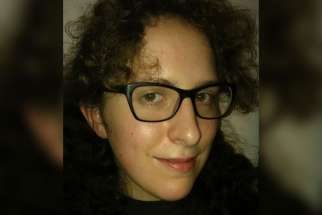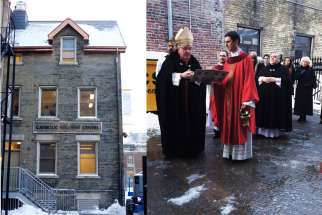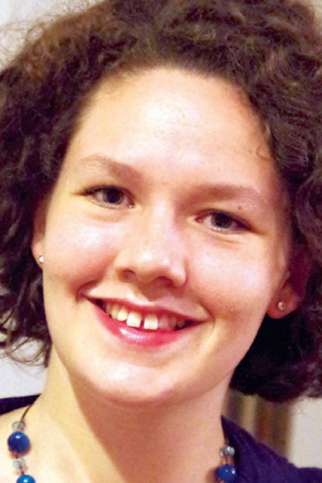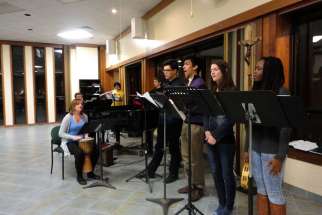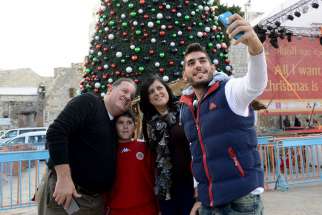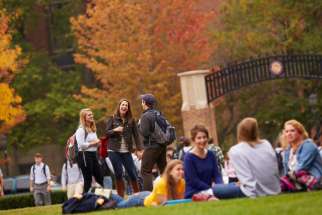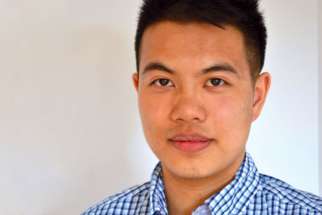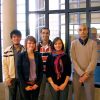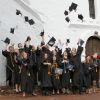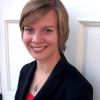My identity is defined in Christ
“What are you?”
That is a great question — and it is not one that I am asked much. Honestly, I am glad people do not ask this of me often, because I rarely know what people want to know when they ask.
Preserving liberal arts in a tech crazy world
Prof. David Seljak has been standing up in front of classrooms and teaching young men and women how to think about their society for approximately a generation. There’s always been an ebb and flow of students, but lately the ebb has the upper hand.
Higher Education
The Catholic Register is proud to present our special feature on Higher Education.
This feature would not be possible without our generous supporters:

The Higher Education special feature came out in the Feb. 28 print and digital issues.
Over the weekend, we'll be adding articles on the CatholicRegister.org homepage for readers to browse.
Here are the articles that you can expect this Sunday:
- Catholic universities take next step in Truth and Reconciliation, by Jean Ko Din, The Catholic Register
- When it comes to theology, Newman bookstore is the place to get it all, by Lasha Morningstar
- New Brescia principal finds right fit, by Evan Boudreau, The Catholic Register
- Saint Mary’s enlists peers in mental health counselling, by Michael Swan, The Catholic Register
- Ignoring spiritual dimension education’s ‘biggest crisis,’ by Junno Arocho Esteves
Ryerson Catholics celebrate blessing of new student centre
What used to be a house in the heart of downtown Toronto is now a new home for Catholic students seeking a place to study and relax.
Voting with faith
This week wraps up election week for the University of Waterloo’s Federation of Students, or FEDs, as we call it. It’s been a busy two weeks of smiling, shaking hands, social media campaigns and general lack of sleep for the candidates. I can’t help but wonder if any of it is appreciated, or even noticed, by the majority of students on campus.
Students of varying faiths choose Catholic colleges
WATERLOO, ONT. - Every Sunday evening, the voices of the St. Jerome’s University choir can be heard ringing from Siegried Hall, where they practice before students gather for Mass, fellowship and a break from their busy lives.
For Arab Christians, getting to Bethlehem involves checks, imbalances
BETHLEHEM, West Bank - Coming to Bethlehem during Christmas is like a family reunion for Afif Hazboun.
Faith on campus a recruiting asset
TORONTO - As due dates for university applications are fast approaching, many Catholic students are taking time to consider faith before making any final decisions.
Parents are addicted to micro-managing
Seeking with hopes of finding
It’s June and I’m headed towards my final year in university. Rather than simply enjoying my summer like my peers, I’m looking at my options.
University receives federal funds for religious diversity project
(CORRECTION 24/10/12 to Michael Taylor's job title)
TORONTO - Citizenship and Immigration Canada has granted half-a-million dollars over three years to the University of Toronto for its Religious Diversity Youth Leadership project.
Launched in late September, the program investigates and acts upon the problems and possibilities of living in a religiously diverse society.
“The most important thing the CIC funding was looking for was the kind of projects that would bring together communities that wouldn’t normally be talking to each other,” said Pamela Klassen, professor in the Department for the Study of Religion and director of the Religion in the Public Sphere Initiative.
The project promises to bring together and build networks of communication between students, faculty, community leaders and youth in the Greater Toronto Area. It is run by the U of T’s Multi-Faith Centre for Spiritual Study and Practice, the Religion in the Public Sphere Initiative and the Centre for Community Partnerships. The project aims to raise awareness on how religious diversity and civic responsibility are connected and to work against exclusion and marginalization.
“We put in a proposal, the RPS, together with the Centre for Community Partnerships and the Multi-Faith Centre that was focussed on a university-based project that would take students out into the community and bring various community organizations in contact with students and with the wider university,” Klassen said.
The project has three main activities. The religious diversity youth training activity will have U of T students enrolled in a service-learning certificate program, which is meant to prepare them for serving in diverse communities, including religious communities.
In the next category of activity, academic and service-learning community partnerships, young adults will work in community organizations or university departments to see first-hand how civic responsibility and religious diversity play out in real-world situations.
“Just as our society becomes more diverse, our responses to spiritual and religious care should evolve with it,” said panelist Michael A. Taylor, Regional Manager with the Ontario Multifaith Council and a mental health professional. “A nation that accepts diversity should accept the entire diversity of a person.”
The third category of activity is the public forums and community research workshops. This connects policy makers, scholars, community leaders, practitioners and students.
The first forum was held on Sept. 27, the day the project launched. Titled “Care of Souls and the Soul of Care,” the forum lasted two days and was held to discuss the successes and failures of religion in publicly funded health care and the challenges religious diversity poses for biomedical health care.
On day two of the forum, the community research workshop brought together palliative care doctors, neonatologists, nurses, executives, hospital chaplains, scholars and students.
“What happens when a young baby dies in an ICU in the hospital and it’s a Muslim baby and the parents don’t want to wash the body, but the nurse thinks the body must absolutely be washed,” said Klassen, recalling the events of the workshop. “How do they negotiate those very emotionally fraught kinds of questions and understand what kinds of compromises the health care system can and cannot make to accommodate religious concerns?”
Future forums will address gender and sexuality in religious communities, youth violence and religious identity, as well as religion and the arts.
A decided purpose will open up future choices
A young man I have known since cutting his umbilical cord 25 years ago will, if all stays on plan, be awarded a doctorate by an Ivy League university in about two years.
Along the way to his PhD, he earned a Master’s degree at Oxford after graduating from one of the Quebec universities whose students have been rioting in the streets since February.
Surrender seems to be the hardest word
After submitting four essays in 24 hours at the end of last semester, I found myself staring into my latest (of many) tea of the day and glumly contemplating the point of getting a degree.
I am in my fourth year of university, and often feel that I’d rather be any place but here. It’s not that school isn’t challenging or that my extracurriculars aren’t engaging. It’s that it seems there’s more to learn from reading the Asperges or hiking in the mountains than from a week’s worth of readings in history or political science. A better understanding of the social, economic and political reasons for contemporary Middle Eastern post-colonial resistance could be very useful — if nothing else, for looking smart in barroom conversation — but once the notes are done, essays written, it seems there is little left of lasting value. I can’t educate my way into heaven.


